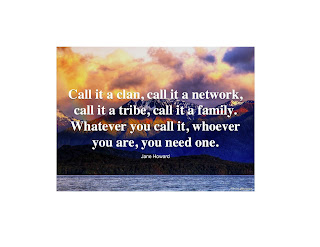Time to Rethink How We Live
Humans instinctively have a need to belong to small groups that have a purpose and understanding – a “tribe”. Although this tribal connection has been almost lost in much of society, bringing it back may be paramount to our intellectual and emotional survival.
Perhaps we should look at the Navajo Nation for inspiration. Many Native American tribes have decreased their numbers, disappeared or lost their homelands, language or culture. The Navajo Nation has done the opposite, and now have over 300,000 members. Their geographical isolation and cultural flexibility have played a large role in this, making them the largest American Indian tribe in the United States. When the Navajo reservation was established in 1868 it consisted of roughly 3.3 million acres of land. By acquiring more land over the years their reservation now covers over 17 million acres in Arizona, Utah and New Mexico. They have retained their identity and been selective about adopting new practices which has allowed them to avoid the peril of other tribes.
Many of us today lead lives filled with too much isolation. The cohesive family units that were once prevalent have become the exception and not the rule. With our ability to move anywhere in the world with ease we have scattered families far and wide. Mothers, fathers, brothers, sisters, aunts and uncles no longer live in the same neighborhood, and most are not even in the same city, town or state. When our everyday life of work, chores, etc. become too much, we cannot easily pop next door to regain strength from our tribe. That sense of belonging we so desperately need is now too far away.
When we isolate ourselves in this manner it can have a big impact on our psychological and emotional well-being. Our tribe is not readily available to help solve a problem or to soothe our soul from a bad day. That much needed sense of belonging is too far away for easy access. The longer we live in this manner, the more difficult our life becomes. I wonder if in time we would end up having no capacity to embrace the warmth and comfort of our family tribe.
I have recently been reading Tribe by Sebastian Junger; he explores what we can learn from tribal societies in terms of loyalty, belonging and our search for meaning. Below are excerpts from his book:
Decades before the American Revolution, Benjamin Franklin lamented that English settlers were constantly fleeing over to the Indians-but Indians almost never did the same. Tribal society has been exerting an almost gravitational pull on Westerners for hundreds of years, and the reason lies deep in our evolutionary past as a communal species. The most recent example of that attraction is combat veterans who come home to find themselves missing the incredibly intimate bonds of platoon life. The loss of closeness that comes at the end of deployment may explain the high rates of post-traumatic stress disorder suffered by military veterans today.
"There’s no use arguing that modern society isn’t a kind of paradise. The vast majority of us don’t, personally, have to grow or kill our own food, build our own dwellings or defend ourselves from wild animals and enemies. In one day we can travel a thousand miles by pushing our foot down on a gas pedal or around the world by booking a seat on an airplane. When we are in pain we have narcotics that dull it out of existence, and when we are depressed we have pills that change the chemistry of our brains. We understand an enormous amount about the universe, from subatomic particles to our own bodies to galaxy clusters, and we use that knowledge to make life even better and easier for ourselves. The poorest people in modern society enjoy a level of physical comfort that was unimaginable a thousand years ago, and the wealthiest people literally live the way gods were imagined to have.
And yet."
We are better human beings when we are part of a family and community working towards what is best for everyone in our tribe. If we continue to separate ourselves from these cohesive family and neighborhood units, then none of us will do well. Living solo and searching for what is only best for one, will lead to not only the destruction of families, but the downfall of a civil world.




Comments
Post a Comment